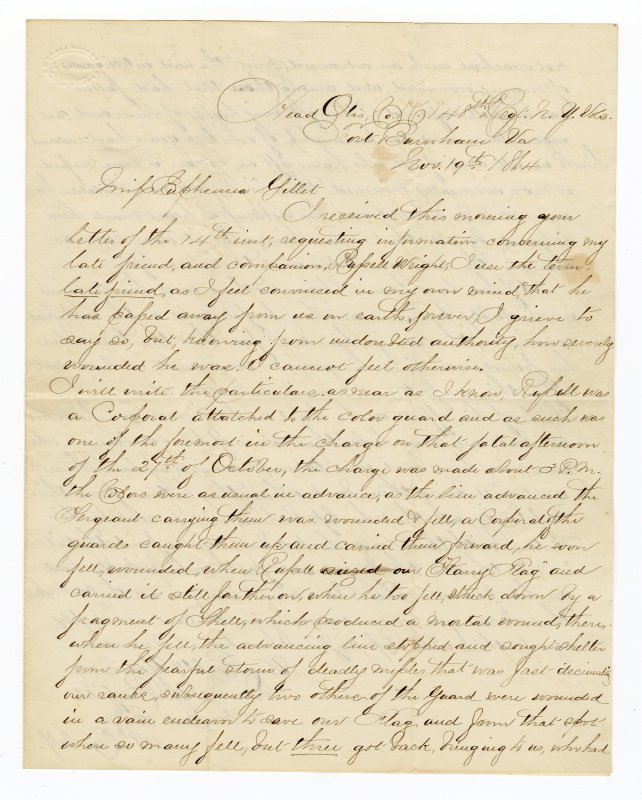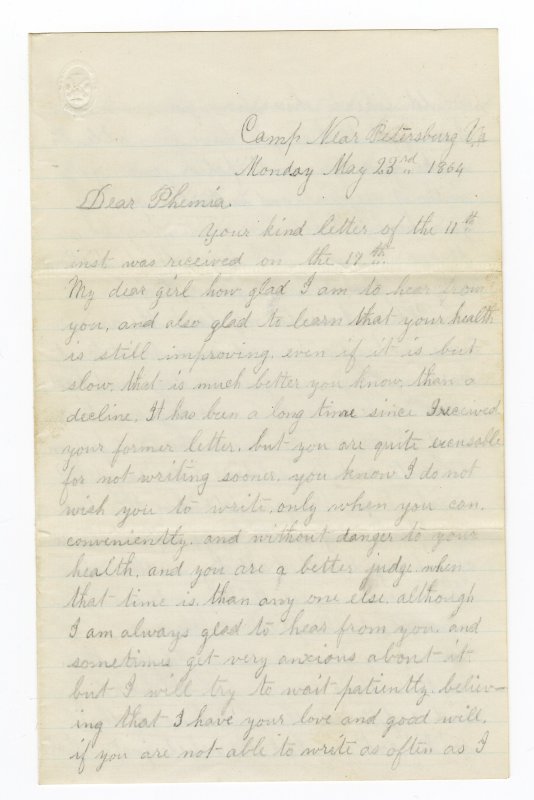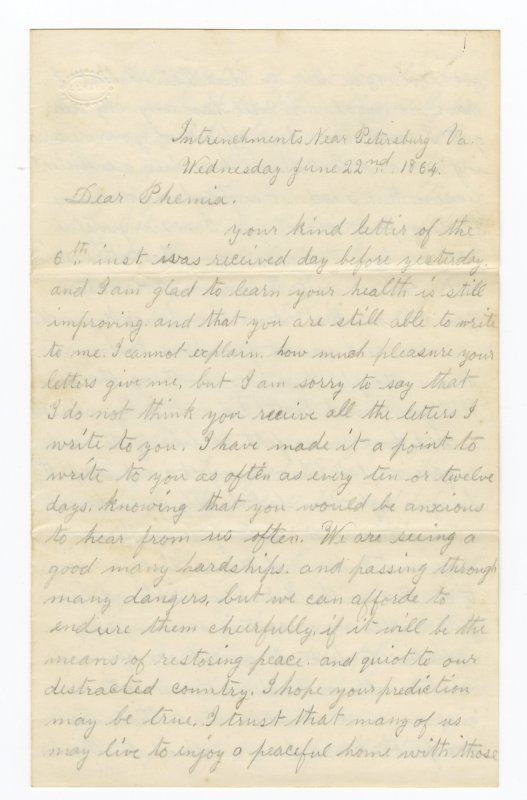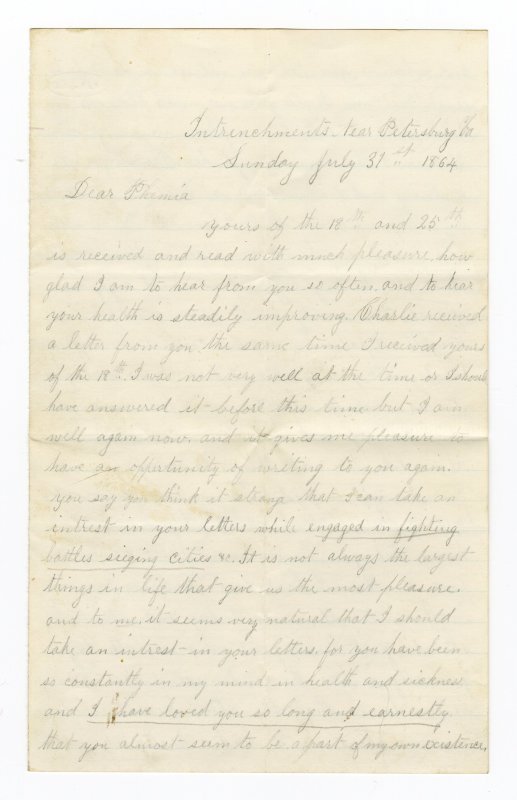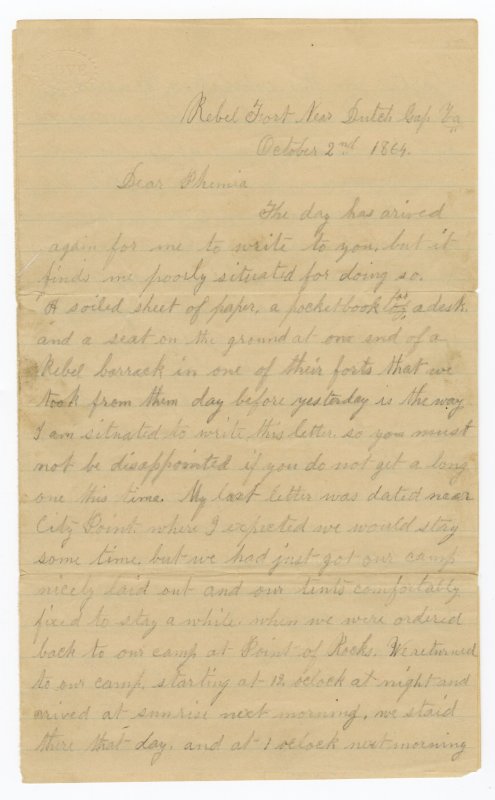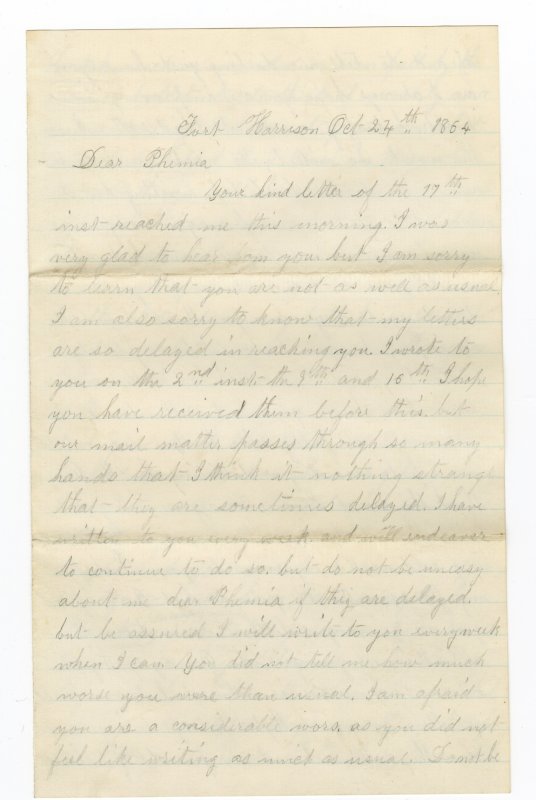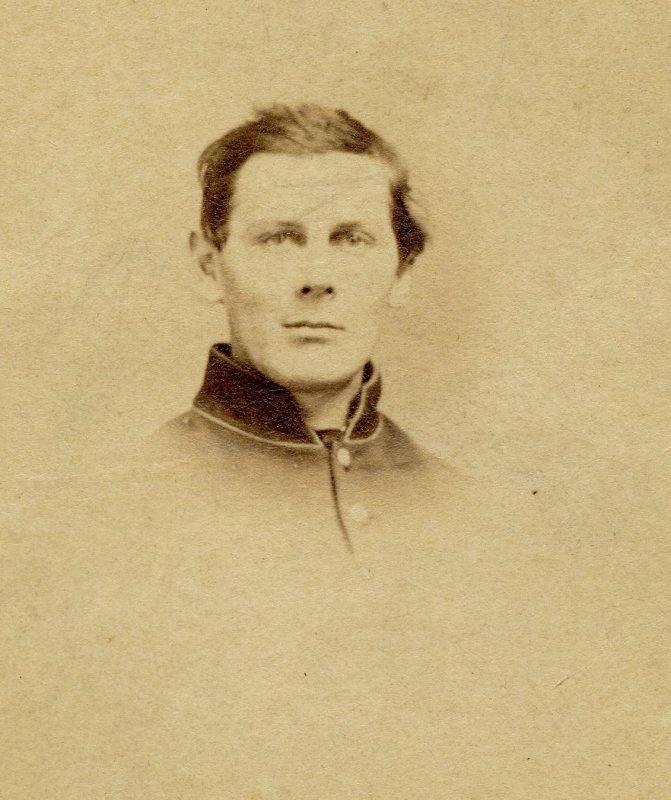148th New York Infantry - Letter Group - Killed at Fair Oaks - Great Battle content and Death Notice
Item LTR-7538
1864
Russell F. Wright & Daniel W. Redfield
Price: $2500.00
Description
6 Original Civil War soldier letters ( 24 pages with 6 envelopes) and a CDV of Russell F. WrightLetter #1 (November 19, 1864 - 1st LT Daniel W. Redfield)
Headquarters, Company K, 148th Regiment, New York Volunteers
Fort Burnham, Virginia
November 19th 1864
Miss Euphemia Gillet,
I received this morning your letter of the 14th inst., requesting information concerning my late friend and companion, Russell Wright. I used the term late friend, as I feel convinced in my own mind that he has passed away from us on earth, forever. I grieve to say so but, knowing from undoubted authority how severely wounded he was, I cannot feel otherwise.
I will write the particulars as near as I know. Russell was a corporal attached to the color guard and as such, was one of the fore most in the charge on that fatal afternoon of the 27th of October. The charge was made about 3 P.M., the colors as usual in advance. As the line advanced, the sergeant carrying them was wounded and fell. A corporal of the guards caught them up and carried them forward. He soon fell wounded, when Russell seized our “Starry Flag” and carried it still farther on where he too fell, struck down by a fragment of shell which produced the mortal wound. Then when he fell, the advancing line stopped and sought shelter from the fearful storm of deadly missiles that was fast decimating our ranks. Subsequently, two others of the guard were wounded in a vain endeavor to save our flag and from that spot where so many fell but three got back, bringing to us, who had not reached such an advanced point, the sad intelligence of many wounded and among those that had fallen was Russell. As a friend, I thought very highly of him and our acquaintance and companionship of over two years had endeared him to us all, and of all who have left us, not one is more missed or more universally mourned than is Russell as a soldier. He was not to be excelled and his nobleness of heart made him beloved by all that knew him. Alas, it does seem as though “the best were taken and the poorest left.”
On his last hours, I know nothing and his remains are probably buried near where he fell, and as the battlefield remains in the enemy’s hands, I fear that the time when his friends can visit his grave is very remote, at least not before this unfortunate war is drawn to a close.
Such of his affects as he had on his person we have not got but we may hope that some of his companions, who were near him and were taken prisoners, may have them and will bring them back when they return from their captivity. All that he left behind will be sent to his sister. With them is a locket, but I am afraid that is not the one that you asked for, that he probably had on his person. These, I am sorry to state, are all the particulars that I can give you and assuring you that we all deeply sympathize with Russell’s friends at home, I remain,
Very respectfully Yours,
Daniel W. Redfield
1st Lieutenant, Company K
148th Regiment, New York
Letter #2 (May 23, 1864 - Russell F. Wright)
Camp Near Petersburg, Virginia
Monday, May 23rd 1864
Dear Phemia,
Your kind letter of the 11th inst. was received on the 17th.
My dear girl, how glad I am to hear from you, and also glad to learn that your health is still improving, even if it is but slow. That is much better, you know, than a decline. It has been a long time since I received your former letter, but you are quite sensible for not writing sooner. You know I do not wish you to write, only when you can conveniently and without danger to your health, and you are a better judge when that time is than any one else. Although I am always glad to hear from you and sometimes get very anxious about it. But I will try to wait patiently, believing that I have your love and good will, if you are not able to write as often as I would like to hear from you.
I am glad to hear you have been able to make your long anticipated journey without accident and without impairing your health. I hope your visit may be a pleasant one, and I trust the predictions of your friends may prove true.
When I wrote my last, the army was making a forward move towards Fort Darling. They were gone six days and had more or less fighting each day. And three or four days of the time the rain fell in torrents and the soldiers were compelled to sleep on the ground (when they had an opportunity of sleeping) without blankets after being drenched all day in the rain. The consequence is that a good many are unwell at the present time.
Our army drove the enemy before them within three miles of Fort Darling and captured the first line of their fortifications. But the rebels just at that time were strongly reinforced and a sharp battle ensued with quite a heavy loss on both sides. But I think our side got a little the worst of it, as they were not able to hold their position, and withdrew in good order within our line of defenses. We had 8 killed and 54 wounded in the 148th but all the casualties in our company was one man, and our captain, both wounded in the arm. The Rebels have tried hard several times since to drive us out of our entrenchments by making night attacks, but thus far they have not accomplished anything but being driven back with consideration loss to themselves and very little to us.
Charlie is a little unwell, but I hope nothing serious will result from it. I think it is nothing but the exposure he has been subject to, and he will probably be well again in a few days. You asked me what the characters and figures meet in my letter. That is a form of writing I learned in Memphis, Tennessee. You requested me to send it to you and I sent the alphabet on a slip of paper which I enclosed in the letter. Did you get it? If so, you can read the balance with the assistance of that. Please tell me how you succeeded. I you cannot read it, I will send the verse in writing. I am on duty this evening and must close for the present. Please accept my love and good wishes.
Affectionately,
R. F. Wright
PS. Do not be alarmed about Charlie for at present his case is not dangerous. He is able to walk about the camp and has not been excused from duty but one day. If he should get worse, I will inform you of it. He does not know that I have written this. If he did, he might think I was giving you unnecessary trouble about him. I think he is a little better this morning. May 24th.
Letter #3 (June 22, 1864 - Russell F. Wright)
Entrenchments Near Petersburg, VA
Wednesday, June 22nd 1864
Dear Phemia,
Your kind letter of the 6th inst was received day before yesterday and I am glad to learn your health is still improving and that you are still able to write to me. I cannot explain how much pleasure your letters give me. But I am sorry to say that I do not think you receive all the letters I write to you. I have made it a point to write to you as often as every ten or twelve days, knowing that you would be anxious to hear from us often. We are seeing a good many hardships and passing through many dangers, but we can afford to endure them cheerfully, if it will be the means of restoring peace and quiet to our distracted country. I hope your prediction may be true. I trust that many of us may live to enjoy a peaceful home with those we love. You tell me dear Phemia that I have no rival nor will have any. My dear girl I have never been afraid of your desiring me. And that should have been a sufficient reason that I had not how to have asked any binding promises of you. I am grateful for your love and assure you that it is received and returned with the warmest devotion. You tell me that “sometime I may know all.” Ever since I was at your home last winter, I had thought there was something that troubled your mind that I did not fully understand. And I have never felt at liberty to make inquiries. But I have ever felt a deep sympathy for your affection. But hardly knew how to sympathize with you for the unknown trouble in trials that you have to contend with. But allow me to advise you to allow no uncertain or imaginary affliction to disturb your peace of mind. Future ills and adversities sometimes give us more trouble than those that are present and I am inclined to think that a portion of your troubles are of this character. At least I most earnestly hope they are. I wish I could be with you occasionally. I believe you would not hesitate to inform me of all you afflictions and difficulties. What is that cannot be, at present, do not forget to “Look on the sunnyside of all things,” for notwithstanding the peculiar form of your disease and your long continued illness. I cannot believe it impossible for you to recover and become as sound and well as before you were taken sick. I cannot tell you how glad I would be to see you enjoying good health again. I am glad to hear you have a pleasant healthy place to live. And hope it may prove of benefit to you. I would be glad to enjoy a peaceful sabbath with you. I assure you I would enjoy it very much, for here every day is alike. We hardly know when a sabbath day comes. Only by keeping the date of the month, but these times will not always last. And I hope the peace and quietness that we may hereafter enjoy will pay us for all that we are enduring. Your translation of the verse was correct and I will give you another…..
I have sent you a list of the casualties in my company as they occurred at different battles. William T. Manahan was the 1st that was wounded in the company. And the Captain was the 2nd. But we have had a good many since and it is hard to tell how soon we may have more. But I feel as if we were all in the hands of a wise just God who does all things well.
I hope I may hear from you as often as convenient, when you are able to write. The letters we receive from friends and those we love is all the time satisfaction we see while in this campaign. I will endeavor to continue to write often, but there is many things to prevent my writing in the letters that I have written do not seem to go very correctly. Therefore, do not be surprised if you do not hear from me often. Charlie is well also the other boys from about Chapinville. Charlie wrote to you not long since. I hope this may find you better and your health improving.
Affectionately your sincere friend,
Russell F. Wright
List of Killed and Wounded in Company K, 148th New York Infantry
Captain Hiram Schutt, wounded arm, May 16th at Drewry’s Bluff
Private William T. Manahan, wounded arm, May 14th at Drewry’s Bluff
Battle at Cold Harbor, June 3rd 1864, 2nd Lieutenant A. M. Adams wounded face and arm
Killed J. McLain from Manchester and A. P. Coon. E. Bloomfield
Sergeant J. Forman from Manchester, wounded, died in hospital
Corporal Rodney from Manchester, wounded in the arm
P. O. Donald from Manchester, wounded head severely
J. Purdy from Manchester, wounded foot
H. D. Holmes, W. Bloomfield, wounded arm
T. Murray, W. Bloomfield, wounded arm
H. H. Shaddock, W. Bloomfield, wounded arm
William Cayler, detached from 15th Regiment, wounded arm
J. Combs, detached from 15th Regiment, wounded leg
D. Tubbs, detached from 15th Regiment, wounded shoulder
C. Fulkerson, detached from 15th Regiment, wounded breast
June 15th Moving on Petersburg, F. J. Lee, Hopewell, left arm off and back severely
R. Calhoun from Manchester, wounded in knee
W. C. Rouse from 16th Regiment in the right eye severely, N. Turner from Manchester missing
June 18th Battle of Petersburg, Corporal J. H. Baker, W. Bloomfield, killed
H. B. Webb from West Bloomfield, wounded in foot
M. N. Herald from Manchester, wounded shoulder severely
Sergeant D. W. Readfield from Hopewell, wounded in shoulder severely
This list is correct of all that have been wounded severely and killed. Quite a number of others have been wounded but not severe enough to leave the company. N. Turner from Manchester was probably taken prisoner. He was not injured when last seen and was very near the enemy and was not falling back when all the others were compelled to do so to save themselves. When advancing over ground that we are not acquainted with and we are attacked, we are sometimes compelled to fall back to get a good position. This was the case when Turner was left. Nearly all of Company A was taken prisoner the same day. When Daniel Readfield was wounded, we were within one mile of Petersburg, laying in a cornfield waiting a favorable moment to charge on the enemy’s rifle pits in front of their works around Petersburg. We charged soon after Daniel was hit, and took the rifle pits and fifteen or twenty prisoners and secured a good position within half or three quarters of a mile of the city and some said it was within the Corporation. About three o’clock we made a charge on the enemies works. But it proved a failure and nothing was gained but a slight advancement of our lines. We do not always have to retreat when we make an unsuccessful charge. We sometimes fall on the ground and allow the enemy to do their worst while we dig rifle pits and throw up breast works with our bayonets, tin cup and plates and that was the way we managed in this charge. We held our position til next morning when we were relieved and returned to Point of Rocks and it was reported that we were going to New Bern, NC but we were again ordered back and we are now in the entrenchments again near Petersburg. But I cannot tell how long we shall stay here.
Letter #4 (July 31, 1864 - Russell F. Wright)
Entrenchments near Petersburg
Sunday July 31st 1864
Dear Phemia,
Yours of the 18th and 25th is received and read with much pleasure. How glad I am to hear from you so often and to hear your health is steadily improving. Charlie received a letter from you the same time I received yours of the 18th. I was not very well at the time or I should have answered it before this time. But I am well again now and it gives me pleasure to have an opportunity of writing to you again. You say you think it’s strange that I can take an interest in your letters while engaged in fighting battles, sieging cities, etc. It is not always the largest things in life that give us the most pleasure, and to me it seems very natural that I should take an interest in your letters for you have been as constantly in my mind in health and sickness and I have loved you so long and earnestly that you almost seem to be a part of my own existence and whatever you take an interest in never fails to interest me. It also gives me much pleasure to know that I still hold a place in your affections. How can I thank you enough, dear Phemia, for your untiring and faithful love expressed in your letters. They always assure me that I have at least one dear friend in whom I could place implicit confidence. I should be very happy if we could enjoy more of each other’s society in the place of exchanging thoughts on paper. But as this cannot be at present, I hope nothing may occur to prevent our writing as often as usual, for when I receive a letter from you, which I always look for with so much pleasure, it seems like the next thing to seeing you.
I would be glad to know how you are passing this pleasant Sabbath day. I am glad to know that you have a more quiet place to pass it than I have here. Our regiment is in the entrenchments today and notwithstanding it is as quiet as a Sabbath day generally is here. The continual pickett firing reminds us that the stern realities of war is about us. We had a pretty sharp battle yesterday morning. But there was only one division of the 18th Corps in it that was actively engaged. The remainder acted as a reserve and supported the 9th Corps which was in front and done the most of the fighting. Our troops had mined one of the enemy’s forts and soon after daylight yesterday morning it was blown up and our troops charged on the enemy’s lines. And at the same time our artillery opened along our lines. And for two or three hours the heaviest artillery fire that I have yet heard was kept up. The demolished fort and two lines of earthworks was taken from the enemy. And the battle lasted till near noon, but no further advance could be made and the firing gradually died away. And about the middle of the day our Corps was withdrawn from the field and we returned to our camp. The battle took place in front of the 9th Corps which is some distance to our left and a little south of Petersburg. I do not know as it has resulted in any material advantage to us.
Our side took quite a number of prisoners and I understand we lost some. We also lost pretty heavily in killed and wounded and I presume the enemy’s loss was full as large. But Petersburg is not taken yet and probably will not be very soon. But every thing about indicates that some move will be made very soon. But what that will be, time will prove. Our regiment was in the reserve and therefore was not engaged, and two was all that were wounded in the regiment. I hear some talk about being relieved from this place but do not know as there is any reality in it. If we should leave here, I shall endeavor to write to you the first opportunity.
I am glade to hear you are enjoying yourself with your friends and when you get ready to return home, I hope it may be in the enjoyment of good health. I am glad to hear that Miss ___ is recovering from her illness. Charlie received a letter from home recently. All the boy from Hopewell are enjoying tolerable good health. Frank Thompson is in the hospital and has been for some time. But I do not think he is dangerously ill from what others tell me. Charlie is well and this leaves me in good health. I am very grateful for your prayers and good wishes. May Heaven bless and watch over you always. I remain as ever your affectionate friend,
Russell F. Wright
To Miss E. O. Gillet
Letter #5 (October 2, 1864 - Russell F. Wright)
Rebel Fort Near Dutch Gap, Virginia
October 2nd 1864
Dear Phemia,
The day has arrived again for me to write to you, but it finds me poorly situated for doing so. A solid sheet of paper, a pocket book for a desk and the seat on the ground at one end of a Rebel barracks in one of their forts that we took from them day before yesterday, is the way I am situated to write this letter. So you must not be disappointed if you do not get a long one this time. My last letter was dated near City Point. Where I expected we would stay some time. But we had just got our camp nicely laid out and our tents comfortably fixed to stay awhile when we were ordered back to our camp at Point of Rocks. We returned to our camp starting at 12 o’clock at night and arrived at sunrise next morning. We stayed there that day. And at 1 o’clock the next morning we started on this expedition. We moved to the James River near Dutch Gap and crossed on a pontoon bridge. And at sunrise we were driving in the enemy’s pickets. We drove them several miles until they reached their line of entrenchments and then a line of battle was formed. And we charged their works and succeeded in capturing this fort and one more and about fifteen guns. But the force was so small at the time that they retook one of the forts and they made desperate efforts after being reinforced to retake this one. But their efforts were vain. For they lost about 300 prisoners besides a large number in killed and wounded. They charged three or four time. But were repulsed as often as they advanced. And now we have it so strengthened that they will not be likely to try it again. We are having good success in this vicinity. But I presume you can learn more from the papers than I can tell you.
Your letter of the 19th of September was the last I have received from you. In that you told me you intended to start for home on the 28th inst. I presume you write as often as usual but we are moving about so much that I do not receive them. Charlie got well and returned to the company last night. But I am sorry to inform you that he got wounded today about 12 o’clock. He was sitting in one of the rebel barracks and a stray bullet passed through one end of it and struck the back part of his left ankle low enough down to cut the top part of his shoe. But the bullet did not come with force enough to pass through. It nearly buried itself in the flesh and I think injured no cords or bones. I helped to carry him to the Physician and saw the ball taken out without increasing the pain and then less than ten minutes after he was hit. It was dressed and he has now gone to the rear. He did not lose scarcely any blood. So his strength will not be reduced on account of it and it is in a place that he can attend to it himself. So it will not be neglected in the hospital. I heard the doctor tell him he was very fortunate in getting so slight a wound. Now do not be troubled about him dear Phemia. His wound may be a soar one. But it is not a dangerous one if it is attended to. And it is probable that he will get a furlough on account of it. And he may be saved from a much worse one. We are seeing a pretty rough time this move. And probably will see some more before it is over. But casualties in our regiment have not been very many thus far. Charlie is the only one in the company.
I have written to you every week as usual and shall continue to do so as long as I can. I hope I may receive the letter that I am sure you have written to me. I am lonely without them. Please direct to the 1st Brigade hereafter in place of the 2nd. We have been changed to the 1st. do not be troubled dear Phemia on my account. I have been protected by a kind providence thus far. And I feel that he is still able to protect me at all times. May the blessings of Heaven always be yours.
Truly and affectionately,
Your Sincere Friend,
Russell F. Wright
To Ephemia O. Gillet
Letter #6 (October 24, 1864 - Russell F. Wright)
Fort Harrison
October 24th 1864
Dear Phemia,
Your kind letter of the 17th inst reached me this morning. I was very glad to hear from you but I am sorry to learn that you are not well as usual. I am also sorry to know that my letters are so delayed in reaching you. I wrote to you on the 2nd inst., the 9th and 16th. I hope you have received them before this but our mail matter passes through so many hands that I think it nothing strange that they are sometimes delayed. I have written to you ever week and will endeavor to continue to do so. But do not be uneasy about me dear Phemia if they are delayed. But be assured I will write to you every week when I can. You did not tell me how much worse you were than usual. I am afraid you are considerably worse as you did not feel like writing as much as usual. Do not be afraid to tell me darling just how you are. I always hope you are improving in health. But if you are not, I had rather know the worst. Do not try to write much to me when you do not feel like writing. But I would be glad to hear from you as often as usual. But do not try to write but a few words just to let me know how you are. But do not write any when you think it will be an injury to you. I should be very lonely without your letters. But I had rather endure that than know you had written to me when you were not fully able to. You did not tell me what caused your declining health. Do you think the air of Broom County agrees with you better than it does in Stueben, or is the increasing cold weather injurious to you. Perhaps my fears are without grounds but I am afraid you are grieving a little too much over the afflictions of your friends. Our sympathy for others I am aware is natural. But we should not allow our sympathetic feelings to injure us when they will not aid our friends. If I should be taken sick or wounded, or even fall by the enemies bullets, try to think of me only as a friend darling. I do not grieve over what cannot be helped. But trust in “him who does all things well,” for we are never so much afflicted. But our case might be worse. I have always believed and still believe that we shall meet again. But if I am mistaken in this, I trust we may both be prepared to meet in a better world. I learned through a letter written at Hampton Hospital to me of the members of my company that Charlie had gone North. But I did not hear where he had gone nor how he was getting along. I hope he will be allowed a furlough for it will be a great pleasure to him as well as you and your friends to have an opportunity to visit home. I am sorry to hear that Niles (Breese) was taken prisoner. I was aware that our cavalry met with a slight repulse before Richmond on the 7th inst but did not know that Niles’ regiment was there. I suppose they were near Petersburg. I am still in the same place that I was when I wrote last. Everything is quiet along our lines in front of the fort where we are stationed. We have the fort nearly finished and some of the soldiers have made themselves comfortable quarters, which the cool weather begins to make necessary. When you write again, please inform me how Miss gets along. I often think of her and hope she is recovering but I have not opportunity of hearing from her since Charlie went away. When you write to her, please give her my love and good wishes. Have you decided about staying in Steuben County this winter? If you stay there, I hope it may prove a benefit to you. But do not be discouraged dear Phemia if your health is not as good this winter as it has been. For the cold weather may not agree with your health as well as the warm weather did, and poorer health may be the consigner. I still have your photograph and think as much as ever of it. And I would like very much to have your ambrotype also. I would like to have it in a case the size of the one I gave you. Wrap it well with paper and send it by mail. But do not give yourself any trouble to get it. Have I taken some time when it is convenient? I am in no hurry for it. I will send you a note to get it with and if there is any left, please keep it to purchase stamps and writing material with. I should have sent you some stamps before this. But it is quite inconvenient to get them sometimes or a quantity of them. I hope this may find you as it leaves me. In good health. There was never a day past here Phemia but I think of you many times. I hope my little Janeen may be blessed with the kind care of Heaven and that I may be so fortunate as to soon meet her again.
Goodbye for the present.
Affectionately yours,
Russell F. Wright
To Euphemia O. Gillett

